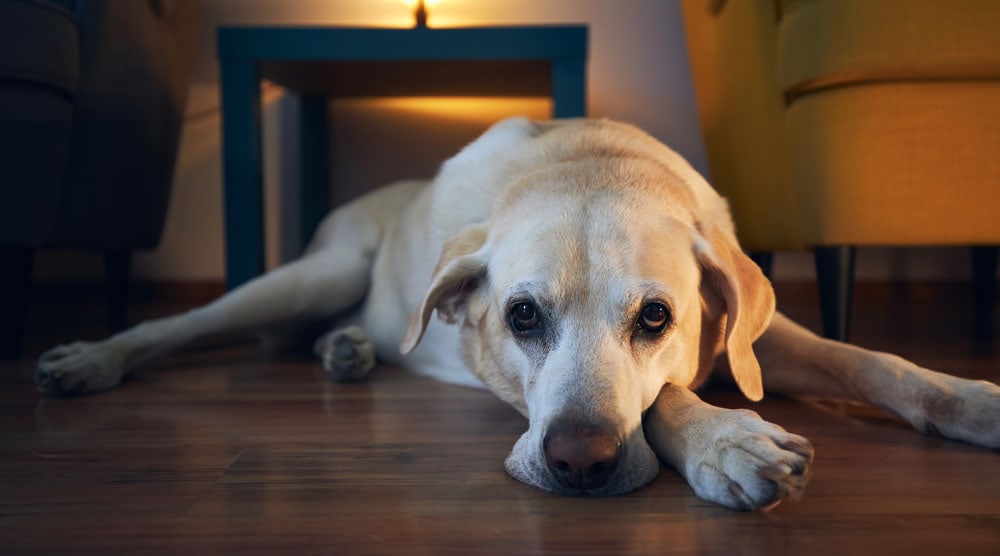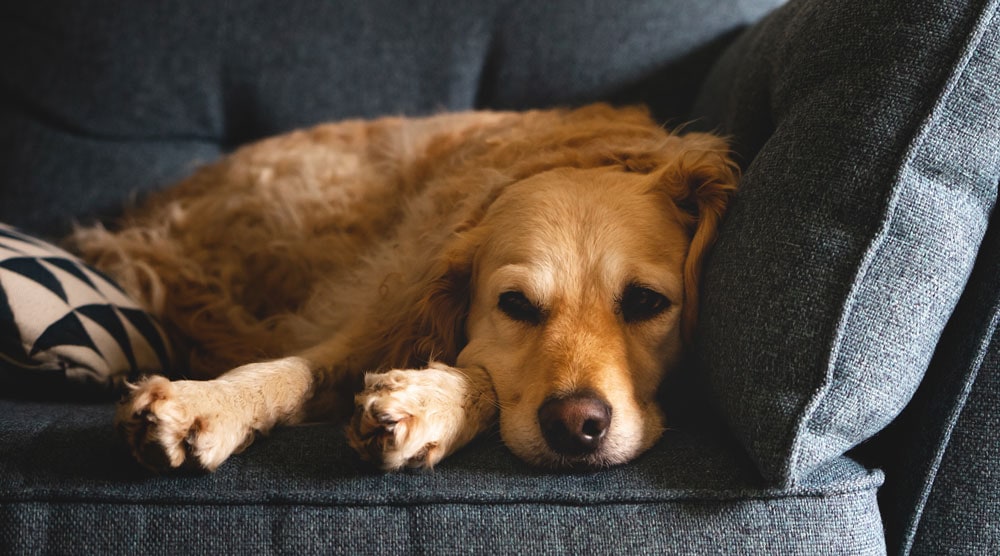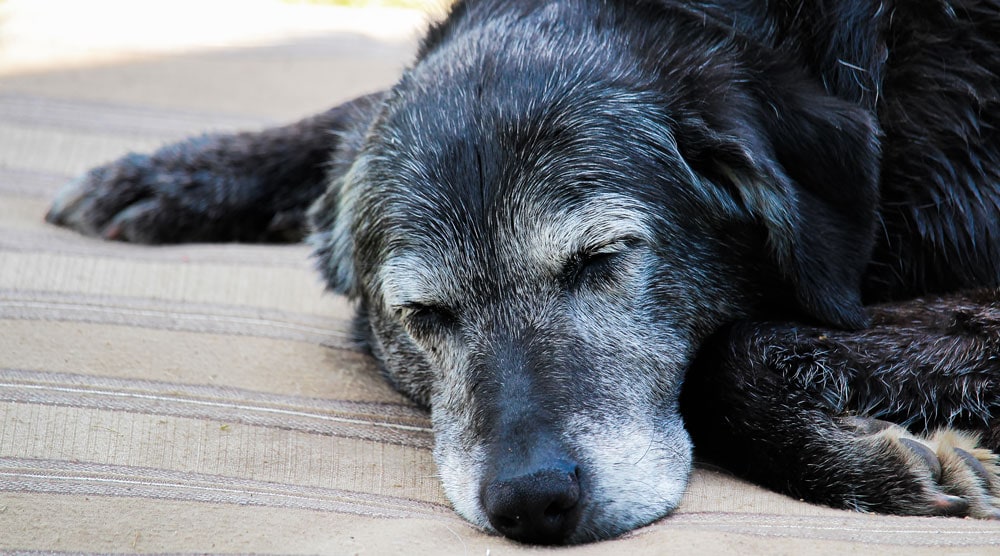Quick Takeaways
- Fast breathing when sleeping in dogs can be as harmless as a sign of dreaming or post-exercise rest.
- However, fast breathing can also be a symptom of a medical condition or stress. Examples include heart disease, lung disease, and heat stroke.
- Contact a vet if breathing doesn’t return to normal within 5-10 minutes, happens continuously, or you notice other symptoms of respiratory distress.
Is your dog breathing fast while sleeping or resting? Fast breathing can sometimes be caused by dreaming or a post-exercise nap. However, an increased respiratory rate at rest can also be a symptom of an underlying medical condition.
In this article, we’ll discuss how to measure your dog’s breathing rate and the potential causes of fast breathing while asleep. We’ll also go through other symptoms of respiratory distress and when to contact a vet.
Contents
- Quick Takeaways
- How Fast Should Dogs Normally Breathe When Sleeping?
- 9 Reasons For A Dog Breathing Fast While Sleeping
- How To Measure Your Dog’s Respiratory Rate
- When Should You Contact A Vet About Your Dog’s Breathing Rate While Sleeping?
- How Will Your Vet Diagnose Your Dog’s Breathing Problems?
- How Fast Should Puppies Breathe When Resting?
- What Could Cause a Puppy To Breathe Fast During Sleep?
- Frequently Asked Questions
- Summary
How Fast Should Dogs Normally Breathe When Sleeping?

A dog’s respiratory rate varies depending on breed, age, and whether they have underlying health conditions.
But as a general rule, an adult dog should maintain a breathing rate of 15-35 breaths per minute when resting or asleep.
A low respiratory rate usually isn’t something to worry about – unless there are other symptoms of illness.
However, if your dog’s breathing rate is above 30-35 breaths per minute when resting, then this could indicate a medical issue.
Heavy or labored breathing during sleep is also a reason for concern. “When resting, a healthy dog calmly breathes in and out. There is no effort, and it sounds like a soft breeze passing through a forest,” says vet Dr Linda Simon. “Their chest movements are steady and not too shallow. They are also evenly spaced.”
A vet should always investigate continuous fast breathing. But you should contact a vet immediately if the abnormal breathing is combined with other symptoms. These could include difficulty breathing, pale gums, coughing, behavior change, or a distended stomach.
Tip: Keep in mind that panting is normal canine behavior. Dogs can’t sweat, so they pant to cause water evaporation, which provides a cooling effect. Panting should quickly return to a normal breathing rate when the dog is resting though, assuming they are not overheated.
9 Reasons For A Dog Breathing Fast While Sleeping
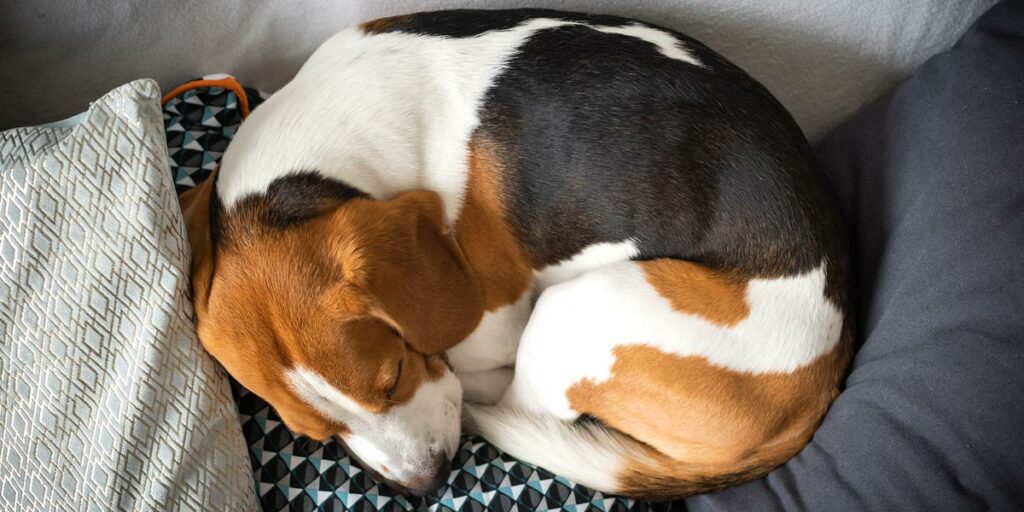
1. Dreaming
Fast breathing when sleeping isn’t always caused by a medical condition – your dog could just be dreaming!
“During REM sleep, dogs are dreaming and may breathe more rapidly, shallowly, and have an increased heart rate,” says Dr Simon.
“They may also twitch or kick, wag their tails, paddle their limbs, and flicker their eyelids. Some dogs even yelp or whine if having an exciting dream (such as chasing a squirrel).”
Canine dreams typically last 1-3 minutes. The dog’s breathing rate will then settle back to a healthy level.
“It is usually puppy owners who contact me worried that their pup is breathing rapidly while sleeping,” says vet Dr Linda Simon. “During REM sleep (when dreaming), dogs can breathe surprisingly rapidly, which concerns some new owners.”
If your dog’s breathing rate doesn’t quickly return to normal, or you can’t see other signs of dreaming, then you should contact a vet.
Note: Puppies often dream more than adult canines, but all dogs can have dreams.
2. Heart Disease or Failure
Heart disease is one of the most common health conditions to cause faster breathing. According to Medivet, it affects up to 15% of dogs, with senior dogs most at risk.
When the heart can’t pump enough oxygenated blood around the body, the dog must breathe faster to bring in more air. As the disease progresses, the dog needs to maintain a higher respiratory rate.
Heart disease can also cause fluid to build up in the lungs when the dog is lying down. This leads to difficulty breathing and regular coughing. It also often forces the dog to move around a lot when resting.
Senior dogs are more likely to suffer from heart disease, but heart issues can affect dogs of any age. For example, puppies may suffer from a congenital heart defect. This can cause symptoms such as tiredness, weakness, and a consistently high breathing rate.
So, if you notice your dog is breathing faster when resting, watch for other symptoms of heart disease. These can include:
- Loss of appetite
- Tiredness
- Coughing
- Weight loss or gain
- Unsettled sleep
- Weakness
- Collapse or fainting
Contact a vet immediately if you notice these symptoms. While heart disease isn’t curable, it can be treated to slow the progression and increase your dog’s quality of life.
3. Lung Diseases, Disorders and Respiratory Infections
Any condition that makes it difficult for a dog to take a full breath will increase their respiratory rate.
After all, if the lungs and respiratory system aren’t working efficiently, the dog must breathe faster to ensure enough oxygen is available.
Some examples of conditions affecting the lungs include:
- Asthma
- Respiratory infections such as kennel cough
- Lung disease
- Smoke inhalation
- Windpipe injury or collapse (called tracheal collapse)
- Allergies (due to the airways being constricted)
Respiratory issues nearly always cause other symptoms, such as coughing, a runny nose, or lethargy. Contact a vet immediately if you notice fast breathing combined with other symptoms.
Certain breeds are also more prone to breathing issues. Brachycephalic breeds, such as pugs and bulldogs, have narrowed airways that make it difficult to breathe. If you have a brachycephalic dog, always monitor their breathing and contact your vet if you have any concerns.
4. Anemia
Lungs transfer oxygen from the air into red blood cells, which are then pumped around the body by the heart.
Anemia is when there are fewer red blood cells than required. This causes the dog’s heart rate and breathing rate to increase to circulate enough oxygen.
According to VCA Animal Hospital, anemia isn’t a condition itself, but instead a symptom of another underlying issue. These can include:
- Parasites such as ticks and hookworms (the most common cause of anemia in puppies)
- Parvovirus
- Autoimmune diseases
- Toxicity (such as from eating rat poison)
- Food poisoning
- Chronic liver disease
- Internal bleeding (such as after a splenic rupture)
- Cancer
An anemic dog will often show other symptoms, such as a cold body temperature, pale gums, lethargy, and weakness. It’s vital to contact a vet if you notice any of these symptoms.
A dog suffering from heat stroke will almost always pant excessively. Other symptoms include red gums, diarrhea, collapse, vomiting, and drooling. Heat stroke requires urgent medical care.
5. Pain
A dog who is in pain will experience physiological stress. Part of the stress response is rapid breathing, along with panting, pinned back ears, dilated pupils, yawning, and lip licking.
Pain can be caused by anything from a traumatic injury to a chronic health condition. You should always contact a vet if you think your dog is in pain. They may be able to provide pain relief and diagnose the underlying health condition.
6. Anxiety
Anxiety can cause a dog’s breathing rate to increase. They will also show other signs of anxiety, such as repetitive behaviors, lip licking, and difficulty fully relaxing.
Some anxiety is ongoing, which is known as chronic anxiety. However, fast breathing in dogs can also be caused by short-term anxiety.
For example, the chronic anxiety or stress of being adopted might cause a rescue dog to breathe fast while sleeping. Acute anxiety often has a more obvious trigger, such as fireworks, thunder, or unfamiliar guests in the home.
7. Heat Stroke
Dogs pant and breathe quicker to cool down. So, a dog suffering from heat stroke will almost always pant excessively and have a faster breathing rate while resting.
Heat stroke can happen if the environment is hot or the dog over-exercises in warm weather. More accurately, it is defined as an increase in body temperature above 104 degrees Fahrenheit (40 degrees Celsius.)
Other symptoms of overheating and heat stroke include red gums, diarrhea, collapse, vomiting, and drooling.
Heat stroke requires urgent care, as it can quickly become life-threatening. The Royal Veterinary College recommends immediately cooling the dog’s body temperature and contacting a vet for advice.
Start by moving the dog somewhere cool, ideally with air conditioning or a fan. Offer them water, but don’t force them to drink.
You can then use the “evaporation method” to help them cool down faster. This involves pouring cool water (not ice cold) over your dog and using a fan to speed up evaporation.
Once you’ve taken steps to start cooling your dog down, contact your veterinarian immediately.
Related Article: How to Keep Your Dog Cool in Summer
8. Sleeping After Exercise
Exercise naturally causes a dog to breathe faster. It can sometimes take a few minutes for your pet’s breathing rate to return to normal, particularly after intense exercise.
This can lead to dogs panting and breathing quickly while sleeping if they start resting soon after exercise. However, if your dog’s breathing rate doesn’t return to normal quickly, then exercise is unlikely to be the cause.
9. Other Causes of Rapid Breathing At Rest
Fast breathing while sleeping is often caused by the conditions above, but many other potential causes exist. Here are a few examples:
- Dehydration. A dehydrated dog won’t have enough blood volume to circulate adequate oxygen. This can cause the breathing rate to increase.
- Sleep apnea. According to PetMD, this is a relatively rare condition in canines, but is most common in flat-faced breeds or overweight dogs. It causes the airways to collapse when sleeping, leading to the dog regularly being woken up.
- Medications. Certain medications may cause a dog to breathe faster. “A common example is corticosteroids, which cause excessive panting in many dogs,” adds Dr Simon. If you notice your dog’s respiratory rate has increased after starting medication, discuss this with your vet.
How To Measure Your Dog’s Respiratory Rate
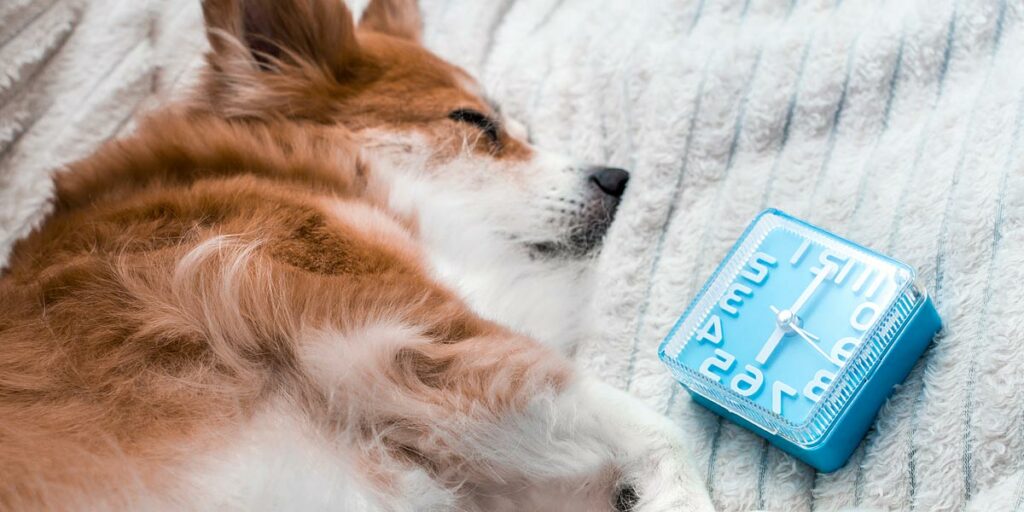
It’s important to accurately measure your dog’s breathing rate. You can use this data to check whether breathing settles back into a normal rhythm or remains elevated for extended periods.
Here’s how to measure a dog’s respiratory rate:
- Wait until your dog is sleeping soundly.
- Don’t touch your dog, as this could startle them. Instead, watch their chest until you can see when they are taking a breath.
- Set a timer for 60 seconds and count how many breaths your dog takes during that time. One breath includes the chest rising and falling.
- Repeat the process several times, with a 15-30 minute gap, to get a more accurate result.
Tip: Keep a log of your dog’s breathing rate to see how it changes over time and identify if your dog is breathing fast. An ongoing record of your dog’s respiratory rate is a useful tool for noticing potential health issues.
When Should You Contact A Vet About Your Dog’s Breathing Rate While Sleeping?
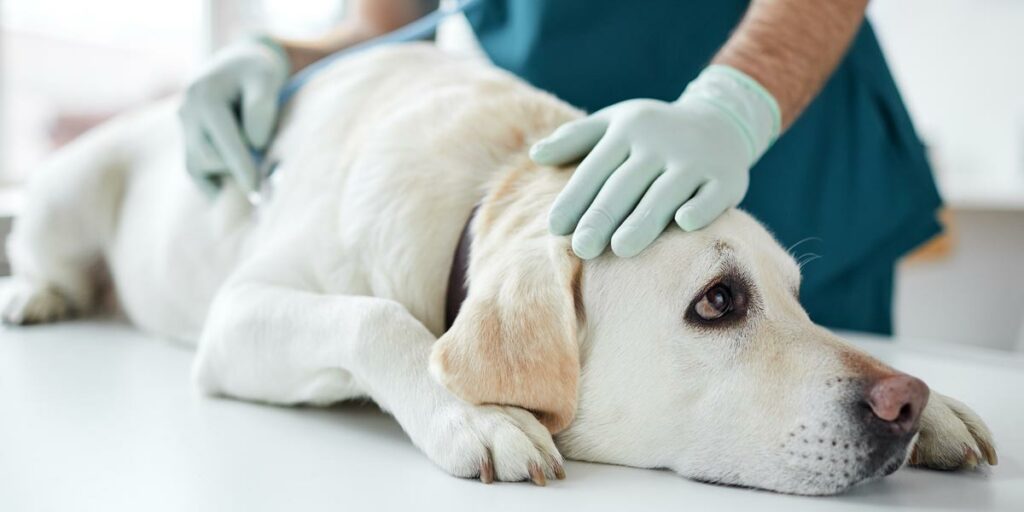
If your dog’s fast breathing is occasional and returns to normal within 5-10 minutes, then it’s probably nothing to worry about. Continuous or frequent fast breathing while sleeping should always be investigated by a veterinarian though.
“Owners should always be aware of their dog’s normal breathing pattern,” says Dr Linda Simon. “If it is more labored, rapid, or noisy than normal, this is cause for concern. If the dog’s breathing rate is suddenly and consistently more than 35 times a minute while sleeping, then this is also a red flag.”
If fast breathing is accompanied by other symptoms of respiratory distress, such as those listed below, contact your vet immediately. Your dog may be suffering from a condition that requires emergency treatment.
- Breathing seems difficult or uncomfortable
- Coughing
- Tiredness or difficulty getting up
- Increased breathing noise or labored breathing
- Loss of appetite or unwillingness to drink
- Pale, red, or blue gums (healthy canine gums are pink)
- The dog uses their stomach muscles to take a breath
- Breathing through the mouth when sleeping rather than the nose
- Shallow breathing
- Distended stomach (this could be a sign of bloat or another gastrointestinal issue)
- Change in behavior or personality
Note: If you’re worried about your pup while they are asleep, ensure you don’t startle them awake. Say their name for a distance until they wake up, rather than physically touching them.
How Will Your Vet Diagnose Your Dog’s Breathing Problems?
Your vet will examine your dog to check what might be causing a faster breathing rate. This will include taking a medical history and a physical examination to check the lungs and heart.
In addition to the physical examination, your vet may recommend diagnostic tests. These may include medical imaging, such as X-rays, to check the heart, abdomen, and lungs.
“Fast breathing is not a specific sign and there can be a wide range of causes,” says Dr Linda Simon. “Some are of no real concern, while others can signify a serious medical issue, making an accurate diagnosis essential.”
How Fast Should Puppies Breathe When Resting?

Many new puppy owners worry their pet is breathing too fast at night.
This is understandable, as puppies tend to breathe a bit faster than adult dogs. For a young puppy, a respiratory rate of 15-40 breaths per minute is normal.
It’s also normal for breathing to appear more of an effort for a puppy, as their delicate ribs and muscles are not yet fully developed. However, if you’re worried about your puppy, or notice any signs of distress, then you should contact a vet.
What Could Cause a Puppy To Breathe Fast During Sleep?
Any of the issues mentioned earlier in this article could cause a puppy to breathe faster while sleeping.
Additionally, a puppy might have a faster breathing rate if they fall asleep soon after exercise. Puppies can almost instantly fall asleep when tired, so the breathing rate may not have had time to return to normal.
In this situation, the respiratory rate should settle back into a healthy rhythm after around 10 minutes. If the fast breathing continues, then it could be a sign of heat stroke or another illness, and you should contact a veterinary practice immediately.
Stress is another reason for a puppy breathing fast. Being adopted into a new home and separated from their mother is very stressful, which causes cortisol levels (a stress hormone) to be increased. This can lead to higher breathing rates when the puppy first falls asleep, although the breathing rate should return to a healthy level during sleep.
Frequently Asked Questions
According to the AKC, rapid breathing in dogs with diabetes can indicate ketoacidosis. This is a severe and life-threatening condition caused by low insulin levels. Other symptoms of ketoacidosis include lethargy, vomiting, dehydration, and a sweet breath smell.
If your dog has diabetes, you should have a supply of ketone urine testing sticks to check for ketoacidosis. A positive test for ketones requires emergency veterinary treatment.
It isn’t normal for a dog to persistently breathe faster or harder after surgery. This can be caused by several factors, including medications, pain, stress, or issues with the surgery.
Any changes to your dog’s breathing after surgery should be discussed immediately with your vet. If you notice pale or blue gums, low energy, or labored breathing, take your dog to the vet straightaway.
There are many potential causes of a dog breathing heavily or fast when they are awake. Some of these are the same as when sleeping, but there are some additional reasons for abnormal breathing.
Examples include asthma, smoke inhalation, parasites, hernias, nausea, and lung cancer. Breed characteristics also affect breathing rate and heaviness.
Summary
A dog breathing fast while sleeping could have a harmless explanation, such as an exciting dream.
However, if your dog regularly breathes fast when asleep, or shows other symptoms of illness, then you should contact a vet. Fast breathing can be caused by a variety of conditions, including heart disease, anemia, lung conditions, and allergies.
Do you have any questions about why your dog is breathing fast while sleeping? Please use the comments form to get in touch. You may also want to read our article about how to tell if your dog is sick.


